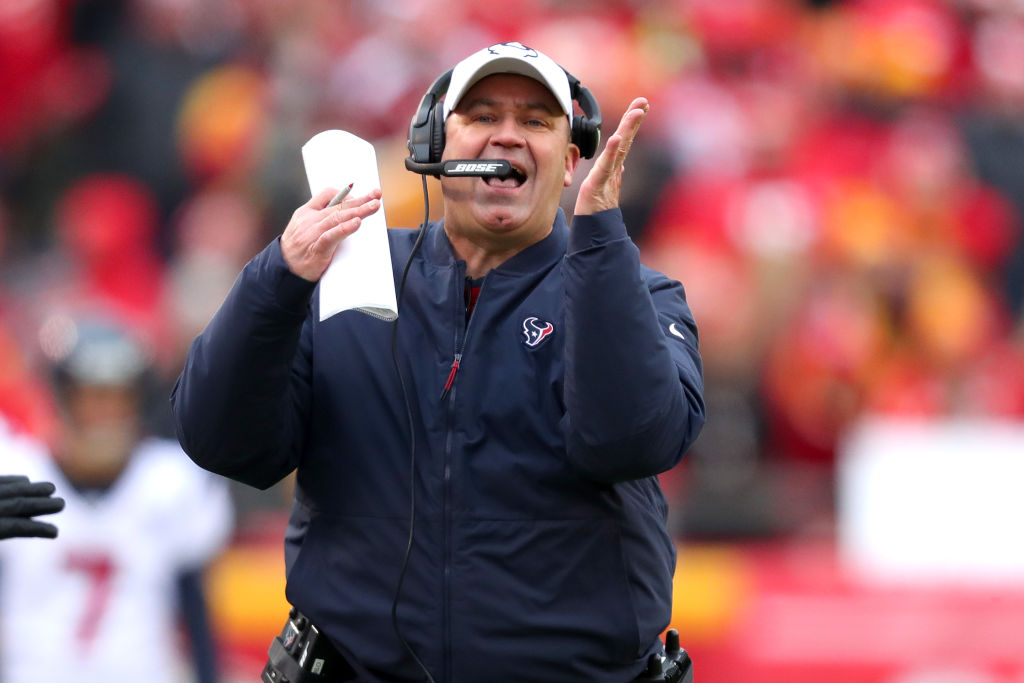NFL
Bill O’Brien Giving up Play-Calling Duties Could Be Great for the Texans

The first step to dealing with a problem is admitting you have one. Bill O’Brien appears to have done that by relinquishing play-calling duties this season.
Houston’s head coach has spent the last four years calling plays on game day. The Texans have won 34 regular-season games in that span.
They have gone just 2-3 in the playoffs.
O’Brien may be regarded as one of the league’s better head coaches, but he has certainly not delivered when it matters most. Houston has posted a 52-44 record under O’Brien’s watch. Yet, playoff success has been fleeting.
O’Brien willing to change his ways after years of early exits
Following successful stints as offensive coordinator of the New England Patriots and head coach at Penn State, O’Brien became the Texans head coach in 2014. He replaced Gary Kubiak, who ironically had a similar pattern of “good but never good enough” results in eight years at the helm. Of course he won a Super Bowl in Denver in 2015.
From 2014-2016, the Texans finished with identical 9-7 records. O’Brien took over play-calling duties beginning in 2016 and it’s safe to say the results have been inconsistent.
After finishing 28th in scoring in 2016, the Texans traded up to select Clemson quarterback Deshaun Watson. In Watson’s rookie year, Houston finished 17th in scoring. The offense finished 11th in 2018 before dropping to 14th last year.
As O’Brien’s role in the organization has increased, he decided to shift play-calling responsibilities to offensive coordinator Tim Kelly. That announcement at the combine perhaps signaled that O’Brien realized it was time for a change.
O’Brien must improve game management skills
One of the principal criticisms of O’Brien is his poor in-game management. Apparently he may have also realized that.
In his combine press conference, O’Brien revealed how letting go of calling plays will result in a shift in focus on game day.
“I think one of the bigger changes would be between series,” he said. “I’ve spent a lot of time with Deshaun and Tim, the offensive line, the running backs, the tight ends, wide receivers on the bench there before we go out there for the next series. I think I’m not going to do probably as much of that. I think I’ll focus more on the whole game and how the game is being played and things like that, but I don’t think it changes it too much.”
By taking a more widespread look at his game-day duties, O’Brien should be able to be a more effective manager. From 2016-2019 he challenged 22 plays and won just eight.
Last season he went just 1-of-8 when throwing the red flag.
More attention to detail could lead to more Texans victories
Coaches (and quarterbacks) are judged by wins. And for O’Brien and Watson to take the next step, it’s time for them to put together a postseason run.
Houston has flexed its offensive muscle in spurts. And injuries to key players like Will Fuller and Lamar Miller certainly didn’t help. But the Texans have intermixed periods of dominant play with lackluster efforts.
With O’Brien able to focus more attention to detail, the Texans could benefit in small areas that add up to big results.
Becoming more disciplined should be one of those key objectives. Surprisingly, in O’Brien’s first year calling plays, the Texans had the fewest penalties in the league. The following year they committed the third-most in the league with 124. They finished in the middle of the pack the last two years.
Cutting back on penalties and reducing turnovers—Houston finished with an even takeaway-to-giveaway ratio—should be priorities for O’Brien to instill this offseason.
And with the pressure and time of calling plays off his mind, maybe he will be able to channel that discipline into a Super Bowl run.











